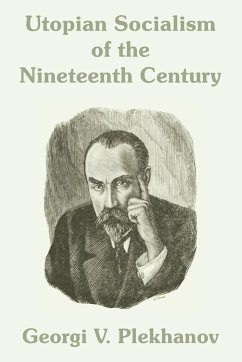Utopian Socialism of the Nineteenth Century was written in 1913, when Plekhanov, though in the main still a dialectical materialist, had diverged from revolutionary Marxism in certain highly essential matters of Marxist theory, and taken up an opportunist stand. An analysis of this work will, however, reveal that even in this Menshevik period of his activities, Plekhanov, in his historical and philosophical studies, remained true to the principles of historical materialism. Dealing with the Utopian socialists of England, France and Germany, this study is marked by a profoundly scientific analysis of the subject. Though the author says he was unable to make a study of the social movements that produced the Utopian socialists' ideas, his exposition of their views points in passing as it were, to certain highly important historical facts that conditioned both the character and the direction of the development of these ideas. What Plekhanov makes a thorough study of is the theoretical sources the Utopian socialists drew from, and the latter's special contribution to the treasure-house of theoretical thought. Georgi Valentinovich Plekhanov (1856-1918) was one of the leaders of Russian populism and after his emigration to Western Europe in 1880 became the foremost Russian Marxist abroad. He founded in 1883, together with Pavel Axelrod, the 'Group for the Liberation of Labor', the first Russian social democratic party, and in 1900 together with Lenin the 'Iskra', the first Russian Marxist newspaper, but a few years later broke with Lenin and sided with the Mensheviks.
Bitte wählen Sie Ihr Anliegen aus.
Rechnungen
Retourenschein anfordern
Bestellstatus
Storno









